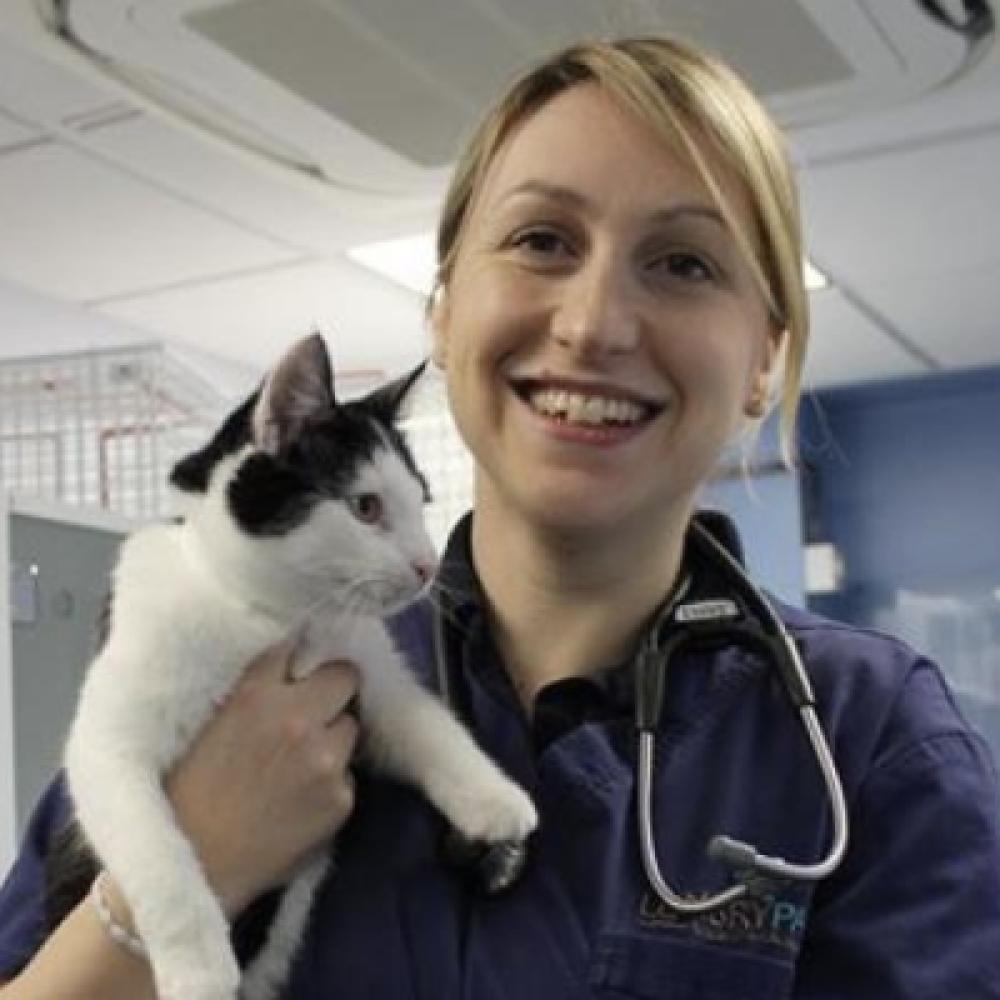Vertiefen Sie Ihr Wissen über Erkrankungen bei älteren Tieren
Wir alle wissen, dass Hunde und Katzen mittlerweile eine längere Lebenserwartung haben. Daher nehmen altersbedingte Krankheiten und chronische Leiden zu. Mit guter Fürsorge können sie jedoch ihren Lebensabend glücklich, gesund und aktiv verbringen. Dieser Focus 20-E-Learning-Kurs vermittelt Ihnen spezielle Kenntnisse auf diesem Gebiet, die sowohl in praktischer als auch ganzheitlicher Hinsicht relevant sind. Die Modultutor*innen stehen Ihnen mit Unterstützung und Beratung zur Seite, damit Sie positiv auf das Leben Ihrer Hunde- und Katzenpatienten einwirken können.
Was beinhaltet dieser Focus 20-Kurs?
Dieser Focus 20-Kurs, der komplett als E-Learning-Kurs über unsere weltweit führende Lernmanagement-Plattform abgehalten wird, bereitet Sie darauf vor, bessere Diagnosestellungen und Behandlungen für Ihre geriatrischen Patienten zu erreichen. Am Ende des aus 5 Modulen bestehenden Kurses wird an einem Abend auch ein einstündiges Live-Webinar abgehalten. Dies ist ein einmaliger und spannender Kurs, der von erfahrenen Expert*innen konzipiert wurde und wesentliche Themen anspricht, wie z. B.:
- Bessere Gesundheitsversorgung für ältere Hunde und Katzen in der Kleintierpraxis
- Renale, neurologische, muskuloskelettale und gastrointestinale Erkrankungen
- Verhaltensauffälligkeiten bei älteren Hunden und Katzen und Verbesserung der Lebensqualität
- Altersbedingte Veränderungen der Physiologie und Ernährungsbedürfnisse
Für wen eignet sich dieser Focus 20-Kurs?
Dieser Kurs eignet sich für alle Veterinärmediziner*innen, auch für diejenigen, die bereits ein ISVPS General Practitioner Certificate (GPCert) und/oder ein von der Harper Adams University verliehenes Postgraduate Certificate besitzen.
Nehmen Sie nicht nur uns beim Wort!
Unsere Teilnehmenden und Vortragenden sind unsere besten Fürsprecher*innen. Sie sind es, die unserer Arbeit Sinn verleihen.
Die wichtigsten Merkmale dieses Kurses
Fünf interaktive Module
5-monatiger E-Learning-Kurs
Modultutor*innen
Unterstützung und Beratung durch entsprechend fachkundige Modultutor*innen
100% E-Learning
Mit verschiedenen Medien, einem Mix aus verschiedenen Lernformen, von interaktiven E-Learning-Lektionen und Videos über Webinare bis hin zu „Wissens-Checks“
40-stündiger Fortbildungskurs
Auf fünf Module aufgeteilt
Mitgliedschaft bei Improve Veterinary Practice
Ein Jahr lang KOSTENLOSER Zugang zur Improve Veterinary Practice Mitgliedschaft
Zugang zur RCVS Knowledge Library
Kostenloser Zugang zur RCVS Knowledge Library
Fachkundiger Kursleiter
Kursleiter ist Sam Taylor BVetMed (Hons), CertSAM, DipECVIM-CA, MANZCVS, FRCVS
ISVPS Foundation Certificate (FCert)
Das ISVPS Foundation Certificate (FCert) ist für Sie geeignet, auch wenn Sie schon ein ISVPS General Practitioner Certificate (GPCert), Veterinary Technician Certificate (VTCert) oder ein Veterinary Paraprofessional Certificate (VPPCert) erworben haben, da es einen tieferen Einblick in Fachgebiete bietet, die möglicherweise zuvor im Rahmen eines modularen Programms behandelt worden sind. Es ist auch für Tierärzt*innen und TFA geeignet, die ein eigenständiges Fortbildungsprogramm in einem bestimmten Fachgebiet suchen.
Fünf interaktive Module
5-monatiger E-Learning-Kurs
Modultutor*innen
Unterstützung und Beratung durch entsprechend fachkundige Modultutor*innen
100% E-Learning
Mit verschiedenen Medien, einem Mix aus verschiedenen Lernformen, von interaktiven E-Learning-Lektionen und Videos über Webinare bis hin zu „Wissens-Checks“
40-stündiger Fortbildungskurs
Auf fünf Module aufgeteilt
Mitgliedschaft bei Improve Veterinary Practice
Ein Jahr lang KOSTENLOSER Zugang zur Improve Veterinary Practice Mitgliedschaft
Zugang zur RCVS Knowledge Library
Kostenloser Zugang zur RCVS Knowledge Library
Fachkundiger Kursleiter
Kursleiter ist Sam Taylor BVetMed (Hons), CertSAM, DipECVIM-CA, MANZCVS, FRCVS
ISVPS Foundation Certificate (FCert)
Das ISVPS Foundation Certificate (FCert) ist für Sie geeignet, auch wenn Sie schon ein ISVPS General Practitioner Certificate (GPCert), Veterinary Technician Certificate (VTCert) oder ein Veterinary Paraprofessional Certificate (VPPCert) erworben haben, da es einen tieferen Einblick in Fachgebiete bietet, die möglicherweise zuvor im Rahmen eines modularen Programms behandelt worden sind. Es ist auch für Tierärzt*innen und TFA geeignet, die ein eigenständiges Fortbildungsprogramm in einem bestimmten Fachgebiet suchen.
Kursdetails
Zusammenfassung der Module
01 - Principles of Geriatric Medicine
Learning objectives:
- Define ‘geriatric’ and describe how life stages are allocated and why
- Describe how many pets around the world fall into older age categories
- List the effects of aging on body cells in general, including effects on the senses and thermoregulation
- Describe how successful senior pet clinics can be run in primary care practice, including marketing ideas and recruitment
- Discuss the human-animal bond (HAB) in terms of attitudes toward euthanasia and caregiver grief
- Describe the influence of aging on choice of sedation and anaesthesia protocols, and how to assess a patient and select appropriate agents.
02 - The Ageing Musculoskeletal System
Learning objectives:
- Describe the effect of aging on the musculoskeletal system and why osteoarthritis can develop in dogs and cats, listing causes
- Based on available evidence, explain the prevalence of osteoarthritis in dogs and cats
- List available pain scoring systems for musculoskeletal pain and describe how to practically apply them to geriatric patients
- Explain options for chronic pain management in dogs and cats, including adverse effects and contraindications
- Discuss environmental modifications for pets with mobility issues including osteoarthritis and describe evidence for, and potential benefits of, therapies such as physiotherapy and acupuncture.
03 - The Ageing Kidney
Learning objectives:
- Explain the prevalence of chronic kidney disease in cats and dogs based on current knowledge
- Describe the causes and pathophysiology of chronic kidney disease
- Explain how to apply the IRIS staging system to both cats and dogs, and demonstrate understanding of the importance of proteinuria and hypertension
- Describe how to practically manage patients with chronic kidney disease and other pathology such as hyperthyroidism and/or osteoarthritis (cats) and other endocrinopathies and/or osteoarthritis (dogs)
- Explain recent developments in renal medicine in dogs and cats and future directions to improve/delay chronic kidney disease.
04 - The Ageing Brain and Nervous System
Learning objectives:
- Explain the effect of aging on the brain and nervous system, including the pathophysiology of cognitive dysfunction (in cats and dogs) and vestibular syndrome in dogs
- List methods to manage patients with neuropathology as geriatrics (pharmacological and environmental manipulation)
- List peripheral neuropathies that develop in aging patients, and describe management options
- Explain why faecal and urinary incontinence may develop with age, and how caregivers can be supported to manage this
- Describe other behavioural pathologies that can be age-associated and how they can be managed (e.g. anxiety and sleep disturbances), and understand the effect of chronic pain on emotions and therefore behaviour.
05 - Nutrition and the Ageing Gastrointestinal System
Learning objectives:
- Explain the effect of aging on the gastrointestinal tract and body and muscle condition and fragility in geriatric patients
- List nutritional interventions and supplements that may be beneficial to geriatric patients
- Provide different nutritional recommendations to manage geriatric cats and dogs with comorbidities
- Explain how to manage loss of appetite in aging cats and dogs
- List non-pharmacological methods to improve food intake and feeding of geriatrics.
06 - Geriatric Medicine End of Course webinar
The webinar will be hosted by the course director Sam Taylor, as part of the final module of the programme. It will be available for live attendance and also recorded for those unable to attend to watch later. Sam Taylor will present a clinical case or scenario for discussion and be available to answer questions on the programme content to help consolidate your learning.
Kursdetails
Zusammenfassung der Module
01 - Principles of Geriatric Medicine
Learning objectives:
- Define ‘geriatric’ and describe how life stages are allocated and why
- Describe how many pets around the world fall into older age categories
- List the effects of aging on body cells in general, including effects on the senses and thermoregulation
- Describe how successful senior pet clinics can be run in primary care practice, including marketing ideas and recruitment
- Discuss the human-animal bond (HAB) in terms of attitudes toward euthanasia and caregiver grief
- Describe the influence of aging on choice of sedation and anaesthesia protocols, and how to assess a patient and select appropriate agents.
02 - The Ageing Musculoskeletal System
Learning objectives:
- Describe the effect of aging on the musculoskeletal system and why osteoarthritis can develop in dogs and cats, listing causes
- Based on available evidence, explain the prevalence of osteoarthritis in dogs and cats
- List available pain scoring systems for musculoskeletal pain and describe how to practically apply them to geriatric patients
- Explain options for chronic pain management in dogs and cats, including adverse effects and contraindications
- Discuss environmental modifications for pets with mobility issues including osteoarthritis and describe evidence for, and potential benefits of, therapies such as physiotherapy and acupuncture.
03 - The Ageing Kidney
Learning objectives:
- Explain the prevalence of chronic kidney disease in cats and dogs based on current knowledge
- Describe the causes and pathophysiology of chronic kidney disease
- Explain how to apply the IRIS staging system to both cats and dogs, and demonstrate understanding of the importance of proteinuria and hypertension
- Describe how to practically manage patients with chronic kidney disease and other pathology such as hyperthyroidism and/or osteoarthritis (cats) and other endocrinopathies and/or osteoarthritis (dogs)
- Explain recent developments in renal medicine in dogs and cats and future directions to improve/delay chronic kidney disease.
04 - The Ageing Brain and Nervous System
Learning objectives:
- Explain the effect of aging on the brain and nervous system, including the pathophysiology of cognitive dysfunction (in cats and dogs) and vestibular syndrome in dogs
- List methods to manage patients with neuropathology as geriatrics (pharmacological and environmental manipulation)
- List peripheral neuropathies that develop in aging patients, and describe management options
- Explain why faecal and urinary incontinence may develop with age, and how caregivers can be supported to manage this
- Describe other behavioural pathologies that can be age-associated and how they can be managed (e.g. anxiety and sleep disturbances), and understand the effect of chronic pain on emotions and therefore behaviour.
05 - Nutrition and the Ageing Gastrointestinal System
Learning objectives:
- Explain the effect of aging on the gastrointestinal tract and body and muscle condition and fragility in geriatric patients
- List nutritional interventions and supplements that may be beneficial to geriatric patients
- Provide different nutritional recommendations to manage geriatric cats and dogs with comorbidities
- Explain how to manage loss of appetite in aging cats and dogs
- List non-pharmacological methods to improve food intake and feeding of geriatrics.
06 - Geriatric Medicine End of Course webinar
The webinar will be hosted by the course director Sam Taylor, as part of the final module of the programme. It will be available for live attendance and also recorded for those unable to attend to watch later. Sam Taylor will present a clinical case or scenario for discussion and be available to answer questions on the programme content to help consolidate your learning.
Qualifikationen
Referent*innen
Unser Zentrum für klinische Exzellenz
Entdecken Sie das neue Improve Veterinary Education Trainingszentrum mit zwei chirurgischen Wetlabs und drei Vorlesungsräumen.
Mehr infos







